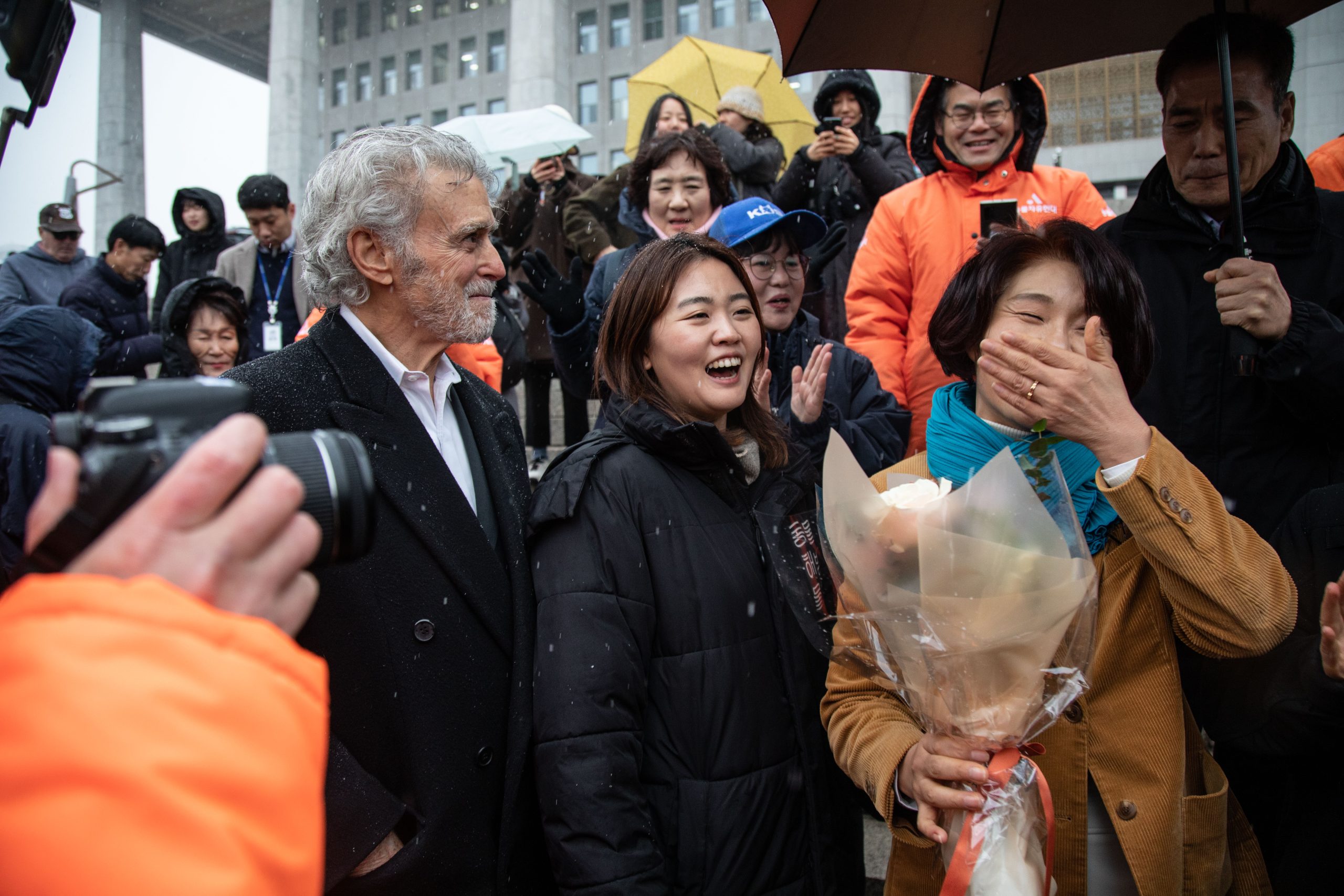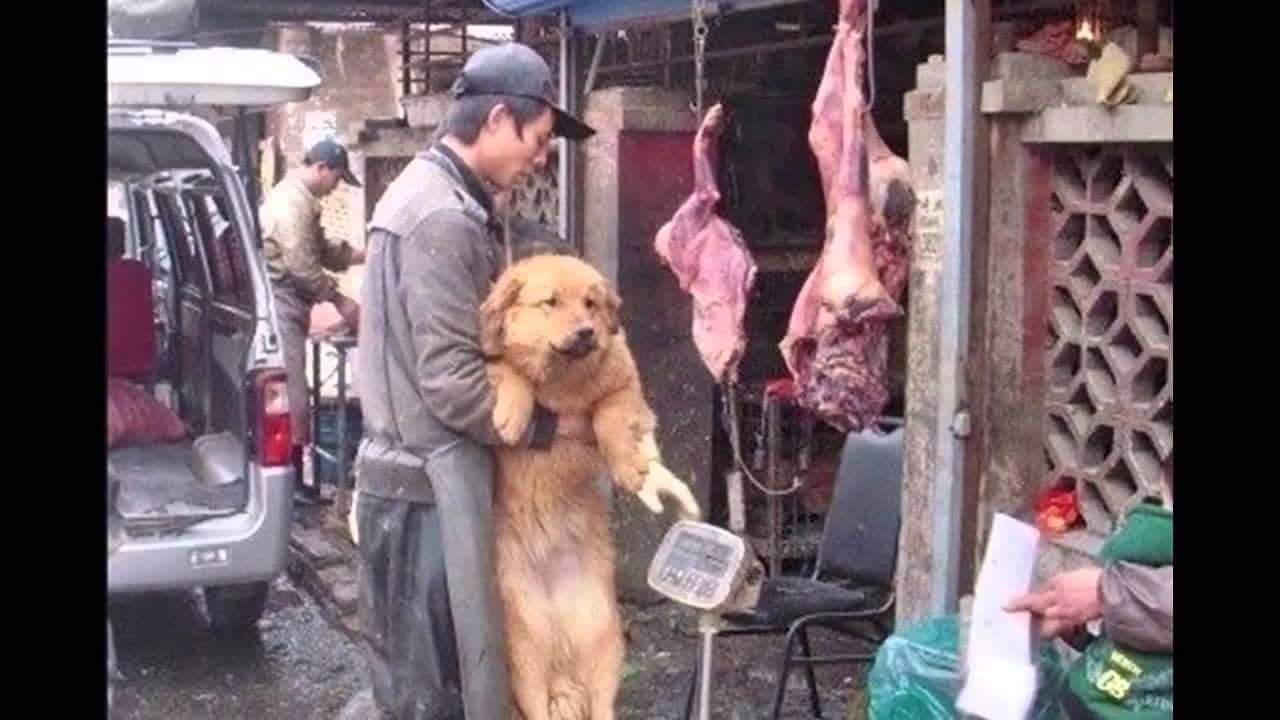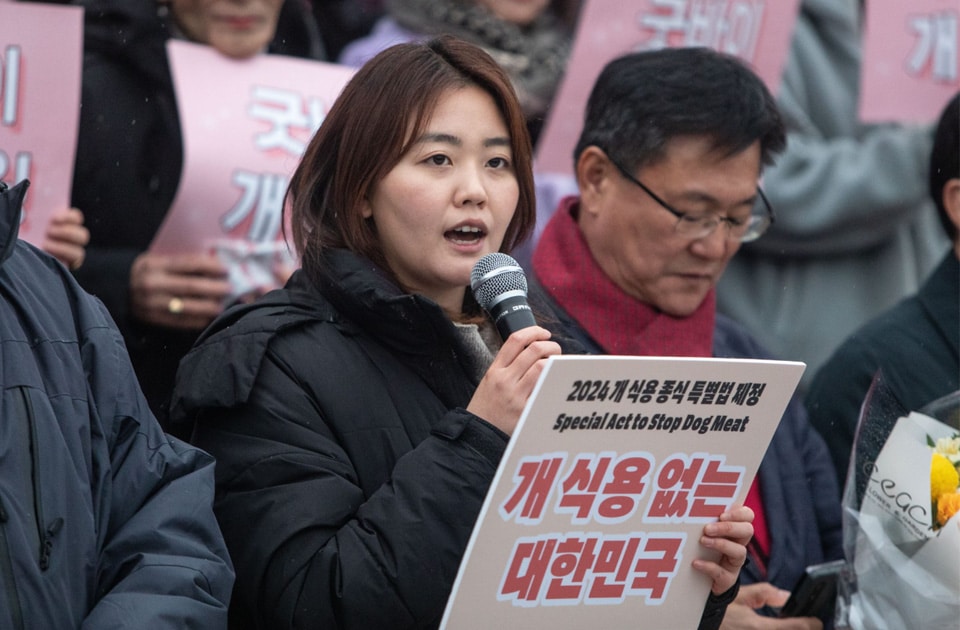Inside South Korea’s Ban on the Dog Meat Trade

After a long pressure campaign from the Korean animal rights movement, South Korea’s parliament passed a new law that bans dog meat starting in 2027. Here’s how it happened.

Los Angeles, January 22nd, 2024 — There were tears and cheers, hugs and speeches as a long-held dream to end the dog meat trade became reality for the dozens of animal activists gathered on the steps of South Korea’s parliament building on January 9th, 2024. The light drizzle and the grey skies could not dampen the joy. By a vote of 208 to zero, South Korea’s parliament had just passed a bill to ban the dog meat trade. That ban will make the breeding, slaughter, and sale of dogs and dog meat for human consumption illegal starting in 2027.
Last Chance for Animals & Animal Liberation Wave Joined Forces to Win!
UnchainedTV’s Jane Velez-Mitchell talked to two of the key campaigners who achieved this historic victory, Last Chance for Animals’ founder/president Chris DeRose and Jiyen Lee, founder/president of Animal Liberation Wave, a South Korean animal rights group. Here’s the interview where they reveal the strategies that led to this huge win. Sheena Gao, of Mercy for Chinese Dogs, also spoke about how she hopes this trend will spread to China where she has helped rescue dogs from the meat trade:
More than 1,000 Dog Meat Farms Will Be Shut Down!
Right now, South Korea has approximately 1,150 dog farms and 1,600 dog meat restaurants, according to government statistics.

Some dog farmers and dog slaughterhouse owners even showed up and protested, clashing with police before the vote. But, their side lost, garnering only two abstentions during the otherwise unanimous vote. Now, all of them will have to submit a plan to phase out their businesses. For those belonging to this gruesome industry, there will be economic compensations to help them transition to another source of income. Starting in January of 2027, there will be penalties of up to three years in prison or a fine of up to 30m KRW ($23,000) for those caught violating the law by continuing to raise, slaughter or sell dogs for meat. This is an unprecedented, historic win for the animal rights movement and for the many Koreans who have tirelessly campaigned for such a ban.
“This is just the biggest thing that I know of in my 45 years in the movement.” — Chris DeRose, Las Chance For Animals
A Team Effort

For almost four decades, Chris DeRose has been one of the leaders of the animal rights movement. In 1984, he founded Last Chance for Animals (LCA), an international, nonprofit animal advocacy organization focused on investigating, exposing, and ending animal exploitation. He explained that the ban was the culmination of many years of detailed research and planning.
“We’ve been fighting for the ban cohesively for about six years, but we had been in there doing preliminary research to see what needed to be done, and that went on for about eight years altogether. And, then, we were in China before that.”
This preliminary work involved undercover investigations that exposed what was going on in the slaughterhouses, the dog farms, and the auction houses. They placed cameras inside these places recording nonstop, producing hundreds of hours of video that shocked the world.
But, DeRose has been very clear in giving credit for this victory to the many Koreans who have been working hard for it, by themselves or as part of animal protection organizations such as the Animal Liberation Wave (ALW). He said the following:
“We acted as a liaison… We gave advice, we helped in that sense, we helped in a lot of different areas, but the credit is all due to Animal Liberation Wave and Jiyen Lee. Jiyen has been great. She’s been able to create things to keep it out there, like these banners, like the laser lights, or like the demonstrations with the dead puppies.”
Korean Animal Rights Activism Is Growing

In 2016, with the help of Last Chance for Animals, Jiyen Lee founded Animal Liberation Wave (ALW). The mission was to eradicate South Korea’s dog meat trade but, also, to end other forms of animal exploitation in the country. She explains what ALW is all about:
“Animal Liberation Wave is known as the first organization in South Korea to put animal liberation at the forefront, to liberate all species of beings, to put anti-speciesism on the forefront, and really spread the word about veganism, about how the South Korean people should adopt the vegan lifestyle.”
The ALW is just one of the many animal rights organizations that have sprung up in this nation, which has seen remarkable growth in vegan outreach in the last few years, as Lee explains:
“In the last six years, we have done multiple campaigns, actions, and demonstrations hosted both by LCA and the Animal Liberation Wave, but also we’ve been at the forefront of collaborating with a coalition, which means we have a bunch of NGO’s who have working in South Korea tirelessly to end the dog meat trade.”
Lee explains some of the tactics they used in this campaign:
“The main tactic that we used is to get the MP’s, the members of parliament, to speak about the necessity to end this brutal dog meat trade, and that was about really making creative scenes that South Korean people have not seen before…like this gigantic banner that we dropped on top of a building in a really strategic location in the heart of Seoul.”
“The possibility of getting this ban reversed is close to zero because this is not just an announcement that the regime made or a policy that the government seeks to implement, but a law that was passed with almost unanimous voting.” — Jiyen Lee, Animal Liberation Wave
All Eyes on China Now

Sheena Gao is the founder of International Citizen Fashion. Along with being a fashion designer, and an accomplished violinist, she is part of the Global Anti-Dog Meat Trade Coalition, serves on the board of directors at the Animal Hope and Wellness Foundation, and is the founder of Mercy for Chinese Dogs. In 2017, driven by her passion to end the dog meat trade, Gao visited Yulin, China, to support Chinese dog rescue efforts during the infamous Yulin Dog Meat Festival. Gao is hoping that this win in South Korea will set a precedent and lead to China banning dog meat as well.
Like the other panelists, Gao is also keenly aware of the need to protect other species from the meat trade, noting that those who are horrified by the notion of dog meat should also be horrified by the killing of pigs, cows, lambs, turkeys and chickens for meat, as those species experience the same terror and pain as dogs who are used for meat.
“This is speciesism. Certain animals are to be eaten; others are to be kept as pets. I saw a picture before that said, ‘What’s the difference between a panda and a pig? Just the outer skin, they look the same.’“
“I transitioned into veganism from fighting against dog meat in 2016. I started to connect the dots. I realized meat is meat, animal is animal. We should treat all sentient beings equally.” — Sheena Gao, Mercy for Chinese Dogs
What's Your Reaction?
Jordi Casmitjana is a vegan zoologist and author.









